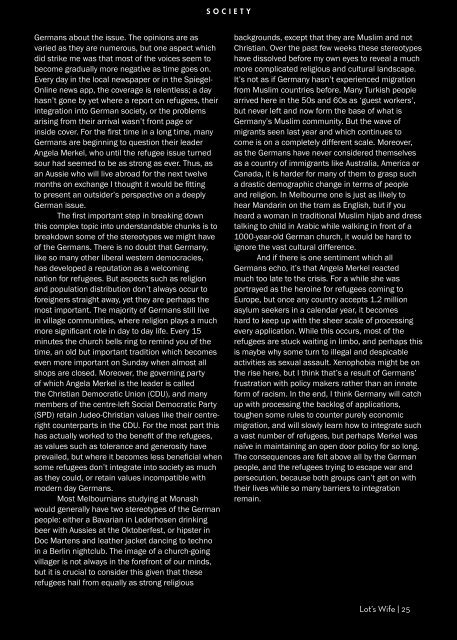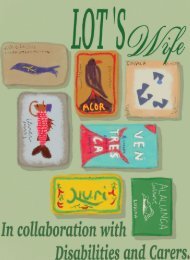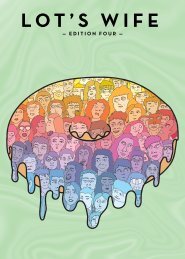Lot's Wife Edition 1 2016
Create successful ePaper yourself
Turn your PDF publications into a flip-book with our unique Google optimized e-Paper software.
SOCIETY<br />
Germans about the issue. The opinions are as<br />
varied as they are numerous, but one aspect which<br />
did strike me was that most of the voices seem to<br />
become gradually more negative as time goes on.<br />
Every day in the local newspaper or in the Spiegel-<br />
Online news app, the coverage is relentless; a day<br />
hasn’t gone by yet where a report on refugees, their<br />
integration into German society, or the problems<br />
arising from their arrival wasn’t front page or<br />
inside cover. For the first time in a long time, many<br />
Germans are beginning to question their leader<br />
Angela Merkel, who until the refugee issue turned<br />
sour had seemed to be as strong as ever. Thus, as<br />
an Aussie who will live abroad for the next twelve<br />
months on exchange I thought it would be fitting<br />
to present an outsider’s perspective on a deeply<br />
German issue.<br />
The first important step in breaking down<br />
this complex topic into understandable chunks is to<br />
breakdown some of the stereotypes we might have<br />
of the Germans. There is no doubt that Germany,<br />
like so many other liberal western democracies,<br />
has developed a reputation as a welcoming<br />
nation for refugees. But aspects such as religion<br />
and population distribution don’t always occur to<br />
foreigners straight away, yet they are perhaps the<br />
most important. The majority of Germans still live<br />
in village communities, where religion plays a much<br />
more significant role in day to day life. Every 15<br />
minutes the church bells ring to remind you of the<br />
time, an old but important tradition which becomes<br />
even more important on Sunday when almost all<br />
shops are closed. Moreover, the governing party<br />
of which Angela Merkel is the leader is called<br />
the Christian Democratic Union (CDU), and many<br />
members of the centre-left Social Democratic Party<br />
(SPD) retain Judeo-Christian values like their centreright<br />
counterparts in the CDU. For the most part this<br />
has actually worked to the benefit of the refugees,<br />
as values such as tolerance and generosity have<br />
prevailed, but where it becomes less beneficial when<br />
some refugees don’t integrate into society as much<br />
as they could, or retain values incompatible with<br />
modern day Germans.<br />
Most Melbournians studying at Monash<br />
would generally have two stereotypes of the German<br />
people: either a Bavarian in Lederhosen drinking<br />
beer with Aussies at the Oktoberfest, or hipster in<br />
Doc Martens and leather jacket dancing to techno<br />
in a Berlin nightclub. The image of a church-going<br />
villager is not always in the forefront of our minds,<br />
but it is crucial to consider this given that these<br />
refugees hail from equally as strong religious<br />
backgrounds, except that they are Muslim and not<br />
Christian. Over the past few weeks these stereotypes<br />
have dissolved before my own eyes to reveal a much<br />
more complicated religious and cultural landscape.<br />
It’s not as if Germany hasn’t experienced migration<br />
from Muslim countries before. Many Turkish people<br />
arrived here in the 50s and 60s as ‘guest workers’,<br />
but never left and now form the base of what is<br />
Germany’s Muslim community. But the wave of<br />
migrants seen last year and which continues to<br />
come is on a completely different scale. Moreover,<br />
as the Germans have never considered themselves<br />
as a country of immigrants like Australia, America or<br />
Canada, it is harder for many of them to grasp such<br />
a drastic demographic change in terms of people<br />
and religion. In Melbourne one is just as likely to<br />
hear Mandarin on the tram as English, but if you<br />
heard a woman in traditional Muslim hijab and dress<br />
talking to child in Arabic while walking in front of a<br />
1000-year-old German church, it would be hard to<br />
ignore the vast cultural difference.<br />
And if there is one sentiment which all<br />
Germans echo, it’s that Angela Merkel reacted<br />
much too late to the crisis. For a while she was<br />
portrayed as the heroine for refugees coming to<br />
Europe, but once any country accepts 1.2 million<br />
asylum seekers in a calendar year, it becomes<br />
hard to keep up with the sheer scale of processing<br />
every application. While this occurs, most of the<br />
refugees are stuck waiting in limbo, and perhaps this<br />
is maybe why some turn to illegal and despicable<br />
activities as sexual assault. Xenophobia might be on<br />
the rise here, but I think that’s a result of Germans’<br />
frustration with policy makers rather than an innate<br />
form of racism. In the end, I think Germany will catch<br />
up with processing the backlog of applications,<br />
toughen some rules to counter purely economic<br />
migration, and will slowly learn how to integrate such<br />
a vast number of refugees, but perhaps Merkel was<br />
naïve in maintaining an open door policy for so long.<br />
The consequences are felt above all by the German<br />
people, and the refugees trying to escape war and<br />
persecution, because both groups can’t get on with<br />
their lives while so many barriers to integration<br />
remain.<br />
Lot’s <strong>Wife</strong> | 25

















